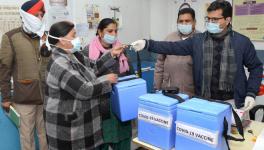Pfizer, SII Seek Emergency Use Authorisation for Covid-19 Vaccines; What are India’s Prospects?
New developments have taken place in the direction of progress for COVID-19 vaccines. Pfizer India has sought an emergency use authorisation from the government of India to use its vaccine in the country. Few days back, Pfizer and BioNTech reported to have acquired over 90% efficacy in their vaccine trial after the phase III results came out. Pfizer got the emergency use authorisation in United Kingdom and Bahrain, and now it seeks the same in India. The Drugs Controller General of India (DCGI) is yet to come out with a decision about Pfizer’s application. Pfizer is first such company to apply for an emergency use authorisation in India.
Right after Pfizer, the Serum Institute of India (SII) has also filed for the emergency use authorisation from the DCGI. The SII is conducting the phase III trial of the Oxford-AstraZeneca vaccine in India, named CoviShield.
Whether the Indian authorities will give green signal to the applications is a matter that would become clear within some time. However, there are certain issues that need to be critically assessed. First is the extreme low temperature needed for the Pfizer vaccine storage, about -70 degree Celsius. And the second is the cost of the vaccine, which is not yet clear. Widespread apprehensions on these issues have already been raised on several occasions.
Regarding the cost, Pfizer was quoted in ThePrint to have said, “Our vaccine approach is based on the principles of ensuring broad access and supplies to governments. This is reflected in all aspects of our agreements with various governments, with the pricing strategy being an outcome of volume, advanced commitment, equity and affordability principles.” The indication is that the cost is likely to be dynamic and it depends upon how much of the vaccine a country procures and what early commitment it provides.
The Pfizer application is being reviewed by the National Expert Group on Vaccine Administration (NEGVAC) headed by Niti Aayog member V K Paul and a subject expert committee under the DCGI. Reportedly, the government is positive about Pfizer’s application, but NEGVAC is more interested in vaccines that are developed in the country. “We have vaccines that are being developed on comparatively easier platforms and are being locally manufactured. This makes procurement, supply, distribution and logistics easier for us,” a Times of India report quoted an official as saying.
Apart from CoviShield being manufactured in India by the SII, the other important vaccine candidates under clinical trials in advance phases are COVAXIN by Bharat Biotech, the indigenous candidate of the country, and Sputnik V being developed by Russia.
Bharat Biotech has already started the phase III trial of COVAXIN at different parts of India. And Sputnik V trial is being conducted by Dr. Reddy’s. There is another candidate of Cadila Healthcare of Ahmedabad, which is in advanced phase of clinical trials in India.
India targets to vaccinate 30 crore priority population. To accomplish the goal, the country would need a huge number of doses, at least for the first phase of vaccination for the target population. It is clear that several different vaccine candidates are needed to meet the need of the country. Now, all depends on how many doses of one kind of vaccine can be produced or procured by India based on the efficacy and safety results of the trials.
Get the latest reports & analysis with people's perspective on Protests, movements & deep analytical videos, discussions of the current affairs in your Telegram app. Subscribe to NewsClick's Telegram channel & get Real-Time updates on stories, as they get published on our website.























